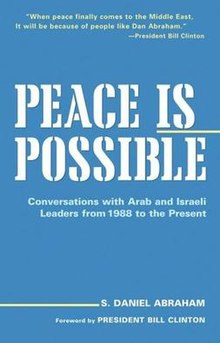 Hardcover Edition book cover | |
| Author | S. Daniel Abraham Bill Clinton, foreword |
|---|---|
| Language | English |
| Subject | Arab–Israeli conflict |
| Genre | non-fiction |
| Publisher | Newmarket Press |
Publication date | March 13, 2006 |
| Publication place | United States |
| Media type | Hardcover |
| Pages | 240 |
| ISBN | 1-55704-702-2 |
| OCLC | 62127834 |
| 956.05/3 22 | |
| LC Class | DS119.76 .A3482 2006 |
Peace Is Possible: Conversations with Arab and Israeli Leaders from 1988 to the Present is a book by S. Daniel Abraham, with a foreword by former U.S. President Bill Clinton. The book was released in hardcover format on March 13, 2006 by Newmarket Press.
Contents
- Statements by individuals involved in peace process
- Notable individuals interviewed by author
- External links
- References
The book is a first-hand account of Slim Fast founder Abraham's more than 15 years of peacemaking efforts in the Middle East, as well as the various reasons he believes peace is possible. [1]
Hillary Clinton spoke about Abraham's book at Princeton University, while recognizing the creation of the "S. Daniel Abraham Visiting Professorship in Middle East Policy Studies" and its first holder, Daniel C. Kurtzer. [2]
The book is utilized as a resource by Case Western Reserve University, [3] and the United States Air Force utilizes other books by Abraham as part of Middle-East peace workshops. [4]
With former congressman Wayne Owens, Abraham established the Center for Middle East Peace & Economic Cooperation. [5] Abraham's work on peace is also featured as part of the Clinton Global Initiative. [6]